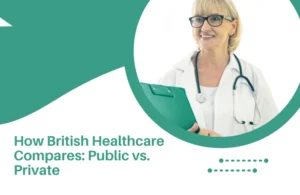
The UK healthcare system is generally considered to be of high quality, with free services available to those who reside in the country. Funded by taxes, the NHS has been a cornerstone of Britain since 194,8 when it was introduced. It is the second-largest single-payer healthcare system in the world after the Brazilian Sistema Único de Saúde. It’s one of the primary reasons why many expats move to the UK and obtain indefinite leave to remain, as it allows them to receive this free healthcare.
With that being said, the NHS often comes under scrutiny due to longer waiting times, resource constraints, and potential rationing of care. This has resulted in more people in the UK looking to receive private healthcare instead, which comes at a high cost but with faster access and typically better facilities. Both of these offer advantages and disadvantages for British citizens and expats who want to receive healthcare in the country.
This guide will take an in-depth look at both public and private healthcare, as we compare them to figure out which one is better for you. Continue reading to find out more.
Public Healthcare Advantages
Affordable
Since the NHS is funded through taxes with higher earners paying more towards it, the money can be used to offer treatments for free or at lower prices. This means that parents who don’t have the spare funding to afford healthcare services for themselves or their children can get free treatment with the NHS. This also helps to prevent any discrimination, as it can be accessed no matter how much money you have.
Widely Accessible
Public healthcare is far more widely available than private alternatives. The NHS operates across the country and offers a broad range of services from general practitioner (GP) visits and hospital care to emergency treatment. These services are generally free at the point of use for residents, meaning anyone can access them regardless of income or social background.
Regulated
The NHS has strict rules and regulations due to it being a government-run organisation, which makes it more equipped to deal with emergencies. We have seen this through their highly extensive Accident & Emergency (A&E) services. A certain high standard must be met, and if this is not met for any reason, then the matter is thoroughly investigated.
Public Healthcare Disadvantages
Long Waiting Times
The NHS faces long waiting times due to a combination of factors, including rising demand, staff shortages, and the ongoing impact of the COVID-19 pandemic. The pandemic exacerbated existing pressures, leading to a backlog of patients needing treatment and disrupting the flow of patients through the system, which is still impacting it today.
Lack of Resources
The demand for NHS services exceeds the available finite resources. This could also be due to funding from the tax system. As a result, there are ongoing concerns and debates about the NHS’s financial situation. Hospitals frequently reach full capacity too, resulting in insufficient bed space for patients and fewer resources.
Workforce Crisis
The NHS has a chronic workforce crisis, driven by years of inadequate workforce planning, lack of accountability for workforce issues and recurrent failure to value and invest in staff. There are several reasons for this, but most people put this down to poor management from the government.
Private Healthcare Advantages
Faster Access
Private healthcare usually provides treatment quickly if patients are unable to access NHS treatment due to lengthy wait times. This is frequently a motivating element for patients who wish to recover from their illnesses as quickly as possible. They can get seen by their GP with a few hours’ notice and with much less hassle.
Specialist Care
For those who require specialist treatments that aren’t covered by the NHS, private healthcare professionals offer more reliability and better services. Private hospitals often offer a wider range of surgical options for joint replacements and sports injuries, with faster access to consultations and procedures.
Advanced Technology
Private healthcare providers often have larger budgets for purchasing and implementing new technologies, including advanced diagnostic equipment, robotic surgery systems, and digital health platforms. This improves treatments and makes them more accurate for patients. They are also more precise, which leads to less invasive procedures and quicker recovery times.
Public Healthcare Disadvantages
High Cost
Not everyone can afford private healthcare due to it usually involving high prices, even with payment plans and medical insurance. It means that these better facilities can’t be accessed by everyone, which isn’t good for social or financial discrimination. This is why the NHS is a more popular choice for those with lower incomes.
Lack of Regulations
The absence of regulations may serve as an excuse to take advantage of present and prospective patients in order to gain notoriety or financial gain. To reduce this risk, people must be taught how to conduct research and make well-informed decisions. Many patients may fall into this trap as a result of their urgency and desperation.
Final Thoughts
While both public and private healthcare systems play important roles in the UK, they serve different purposes and offer distinct advantages. The NHS provides broad, affordable access to healthcare for all residents, ensuring that cost is never a barrier to essential treatment. Whereas private healthcare is higher quality and uses newer technology. It all comes down to what you can afford and what kind of treatments you require.












